牛津译林版高中英语必修一M2U2-wordpower-nadia
牛津译林版高中英语必修一M1U1-wordpower-Nadia

6. Our school has decided to build another b_a_s_k_e_t_b_a_ll _c_o_u_rt, for so many boys choose basketball as their favorite sport.
3. Take the second turning on the right. / Turn left at the second turning.
4. At the end of the first / second crossing, you will find it on your right / left. You can’t miss it.
science lablratory
canteen
an ambulance
First aid centre A hospital
Just now we learned some school facilities. Now use the following words to fill in the blanks in Part C on page 7.
3. Weightlifting involves lifting a __b_a_r_b_e_ll_ overhead.
4. Sport climbing has become very popular these days. It’s reported that kids’ exercise on _c_li_m_b_i_n_g_b_a_r_s_ is of great help to their brains.
牛津译林版英语必修一Unit2Wordpower教案
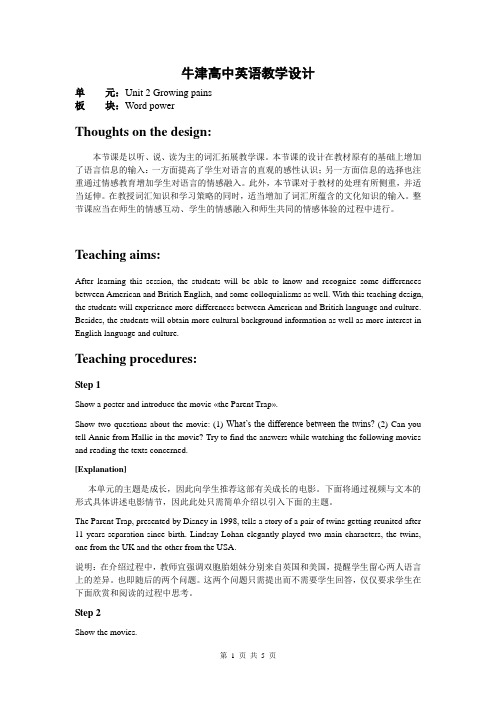
牛津高中英语教学设计单元:Unit 2 Growing pains板块:Word powerThoughts on the design:本节课是以听、说、读为主的词汇拓展教学课。
本节课的设计在教材原有的基础上增加了语言信息的输入:一方面提高了学生对语言的直观的感性认识;另一方面信息的选择也注重通过情感教育增加学生对语言的情感融入。
此外,本节课对于教材的处理有所侧重,并适当延伸。
在教授词汇知识和学习策略的同时,适当增加了词汇所蕴含的文化知识的输入。
整节课应当在师生的情感互动、学生的情感融入和师生共同的情感体验的过程中进行。
Teaching aims:After learning this session, the students will be able to know and recognize some differences between American and British English, and some colloquialisms as well. With this teaching design, the students will experience more differences between American and British language and culture. Besides, the students will obtain more cultural background information as well as more interest in English language and culture.Teaching procedures:Step 1Show a poster and introduce the movie «the Parent Trap».Show two questions about the movie: (1) What’s the difference between the twins? (2) Can you tell Annie from Hallie in the movie? Try to find the answers while watching the following movies and reading the texts concerned.[Explanation]本单元的主题是成长,因此向学生推荐这部有关成长的电影。
牛津版必修一Module1 Unit2 Word power

David: How is your summer holiday, Sam?
Sam: Excellent, during my summer
vacation I joined a soccer ball club and I can
play it better now.
David: Good! I also practised playing football this
/ green fingers
1.Kate, don't be___a_w_e_t_b_l_an_k_e_t___ at the party. Let's
dance together.
2.Alice: Can you tell me what this sentence means?
Tim: This one? Oh, it is __a__n_o_-b_r_a_in_e_r______. I
6. Bob: Hey ! Ellen, you got an A for your history exam. Ellen: Don’t _p_u_l_l_m__y_l_eg____ . Are you serious?
7. Mr. Smith’ garden is the best. He hasg_r_e_e_n_f_i_n_g_e_rs___. 8. Boss: Who is that dull boy? He even doesn’t know where
It means:You are 100 percent certain that something will happen.
3.I ‘ve never expected Lily to act as cool as a cucumber in the traffic accident.
高中英语Module1Unit2GrowingpainsWordPower(2)教案牛津泽林版必修1
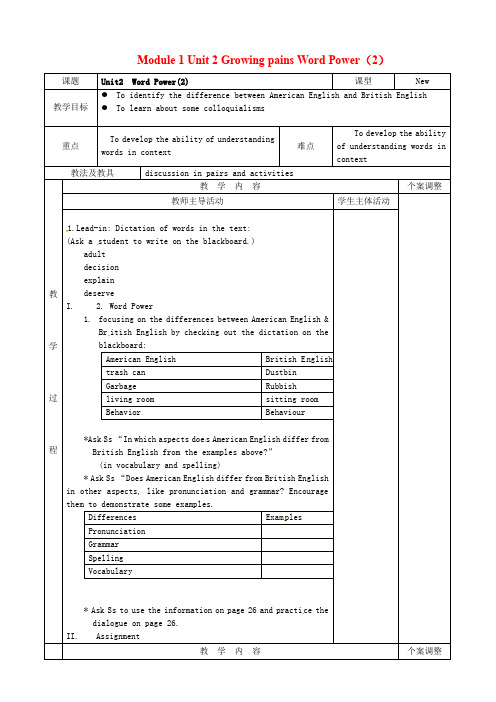
If we don’t win this basketball game by at least twenty p oints,
I will eat my hat.
Meaning: a saying used when you are 100 percent certain that
something will happen
重点
To develop the ability of understanding words in context
难点
教法及教具
discussion in pairs and activities 教学内容
教师主导活动
To develop the ability of understanding words in context
学生主体活动
个案调整
1.Lead-in: Dictation of words in the text:
(Ask a student to write on the blackboard.)
adult
decision
explain
教
deserve
I. 2. Word Power
1. focusing on the differences between American English &
* Ask Ss to use the information on page 26 and practi ce the dialogue on page 26.
II. Assignment 教学内容
个案调整
教师主导活动
1.
What is a colloquialism? How is it used?
牛津译林版高中英语必修一Unit 2《Growing pains》(Word Power)教案1
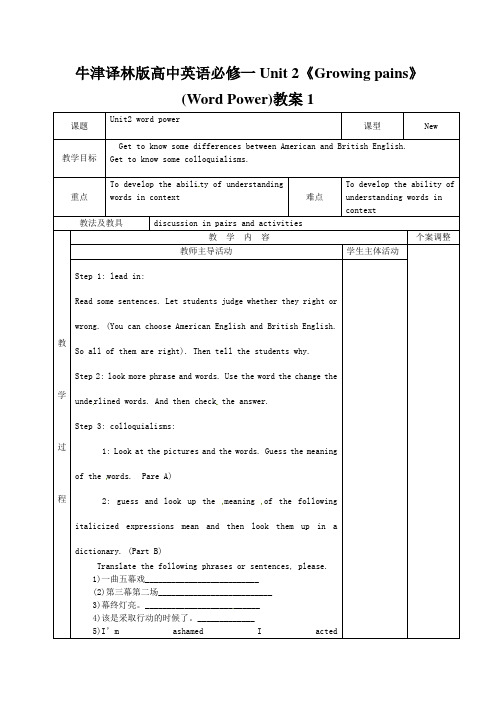
牛津译林版高中英语必修一Unit 2《Growing pains》(Word Power)教案1课题Unit2 word power课型New教学目标Get to know some differences between American and British English. Get to know some colloquialisms.重点To develop the abili ty of understandingwords in context 难点To develop the ability ofunderstanding words incontext教法及教具discussion in pairs and activities教学过程教学内容个案调整教师主导活动学生主体活动Step 1: lead in:Read some sentences. Let students judge whether they right orwrong. (You can choose American English and British English.So all of them are right). Then tell the students why.Step 2: look more phrase and words. Use the word the change theunde rlined words. And then check the answer.Step 3: colloquialisms:1: Look at the pictures and the words. Guess the meaningof the words. Pare A)2: guess and look up the meaning of the followingitalicized expressions mean and then look them up in adictionary. (Part B)Translate the following phrases or sentences, please.1)一曲五幕戏__________________________(2)第三幕第二场__________________________3)幕终灯亮。
牛津译林版高中英语必修1Unit 2Growing painsWord power学案2

Module 1 Unit 2 Growing pains-word power学案Words:vacation n.假期,休假curtain n.窗帘sink n.水池,水槽,洗碗池garbage [U] 垃圾leave vt.使……处于某种状态,听任forbid v. (forbad(e), forbidden) 禁止scene n.(戏剧的)一场;场面;景色grandparent n.祖父(母);外祖父(母)mark n.分数;标志;记号period n.时间段,时期,阶段selfish adj.自私的suggest v.建议;暗示,使想起suggestion n. 建议behaviour n.行为behave v. (行为或举止)表现interest v.使……感兴趣interesting adj.有趣的,有意思的interested adj.感兴趣的explain v.解释explanation n. 解释touch v.触摸touched adj.感动的touching adj.感人的,令人感动的explain v.解释explanation n.解释reason n.理由reasonable adj.合乎情理的unreasonable adj.不合乎情理的punish v.惩罚punishment n.惩罚unpunished adj.免受惩罚的go unpunished没受惩罚bore v.使厌倦bored adj.感到厌倦了的boring adj.令人厌倦的mix v. 混合;混淆mixture n.混合物value n.价值valuable adj.宝贵的,有价值的n.贵重物品valueless adj.不值钱的,没有价值的argue v.争论argument n.议论,争论,论点freedom n.自由free adj.自由的;有空的true adj.真诚的,真实的truly adv.Useful expressions:be supposed to do sth. 应该做……,被期待做某事be in charge of sth. 负责某事be in one’s charg e / be in the charge of sb. 由某人负责punish sb. for sth. /for doing sth 因(做)某事而惩罚某人argue with sb. about/over sth. 与某人争论某事,就某事和某人争吵be upset about / over sth. 为……而感到心烦意乱make a difference 产生差异,使有所不同,起重要作用forbid sb. to do sth. / forbid sb. from doing doing 禁止某人做某事What’s up? 怎么了?be hard on sb. 对某人苛刻in the form of a dialogue 以对话的形式should have done sth. 本应该做某事而未做followed by a big dog 身后跟着一条大狗go unpunished 饶过;没被惩罚can’t wait to do sth. 迫不及待地做某事have one’s arms crossed 双臂交叉turn up the radio a little 把收音机音量开大一点leave out 漏掉after all 毕竟;别忘了at present 目前,当前like crazy 发疯似地,拼命地do sth. like crazy疯狂地干某事in one’s spare time 在某人业余时间里keep sth. in mind 牢记……be meant to be / mean … to be 本意为in a mess 处于混乱状态go out (灯)熄灭do with 处理now that 既然,由于insist on坚持get the room tidied up 把房间整理好clean up收拾干净the only child 独生子deserve to do sth. 配得上做某事not … any more不再,再也不as though 似乎,好像have a good laugh over对……大加嘲笑mix up 混淆,混合be related to和……有关系of great value有很大价值Internet café网吧be proud of 以……为自豪stay up late 不睡觉,熬夜到很晚fail (in) the Maths test 没有通过数学测试be proud of 以……为自豪take / follow one’s advice 接受某人的忠告stay up late 不睡觉,熬夜到很晚fail (in) the Maths test 没有通过数学测试take / follow one’s advice 接受某人的忠告prevent sb. from doing sth.阻止某人做某事waste some time doing sth. 浪费时间做某事refuse to do sth. 拒绝做某事I. Vocabularysurprise vt.使惊奇,是震惊[U] 惊奇,诧异[C] 使人吃惊的事,出人意料surprised adj.“感到惊讶的”,指某人对某事感到震惊surprising adj.“使人惊奇的;惊人的”,事物本身令人惊讶则用surprising[搭配]be surprised at …对……感到吃惊in surprise惊奇地to one’s surprise使某人吃惊的是1. ______ ( surprise ) at the ________ (surprise ) news, the _______ (surprise ) student said with a _________ (surprise ) look, “It’s really very ________ (surprise )”.2. The ______ look on his face suggested he ______ that.A. surprised; wouldn’t have expectedB. surprising; hadn’t expectedC. surprising; would expectD. surprised; hadn’t expected3. 使我感到惊奇的是,我父亲对这个令人震惊的消息并不感到惊讶。
牛津译林版高一英语module2_U2_Wordpower
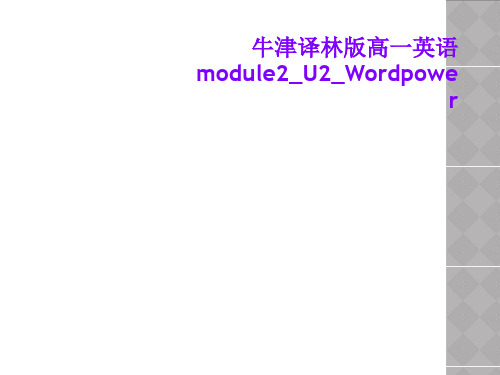
useful when it gets dark.........
map
• Oh, I nearly forgot the 9______ ! Take as many pictures as you can. You can also take a
10_________ to cut food or anything else when needed.
牛津译林版高一英语 module2_U2_Wordpowe
r
Places of interest in China
What kind of things did you take at that time?
Do you know what we should take for an adventure holiday?
camera
map
towel
compass
指南针
waterproof matches 防水火柴
food
flashlight
candles
pocket knife 便携式小刀
first-aid kit 急救包
water purifying tablets
backpack 背包
tent
boots
Read Part A together to consolidate the words we learned just now.
Finish exercise C according to the words from Part A & B.
• I'm glad to hear you are going to have so many adventures in Afica. You must be excited! You'll need strong 1———— because you're going to walk a lot. Take a 2______ as well, because you'll get wet when you go white-water rafting.Equipment is also important. I'm sure you'll take your 3______ and 4______ or camping in the desert, but don't forget
牛津译林版高中英语必修一M2U2-Reading-Nadia

3.What happened to their dog ,Spot?
Spot was ill.
Detailed Reading --- I
1.Why did Eric sound frightened when he saw his parents back?
Because his parents came back home early. 2.What happened to their dog, spot and money?
牛津译林版高中英语必修1Unit 2Growing painsword power教案1
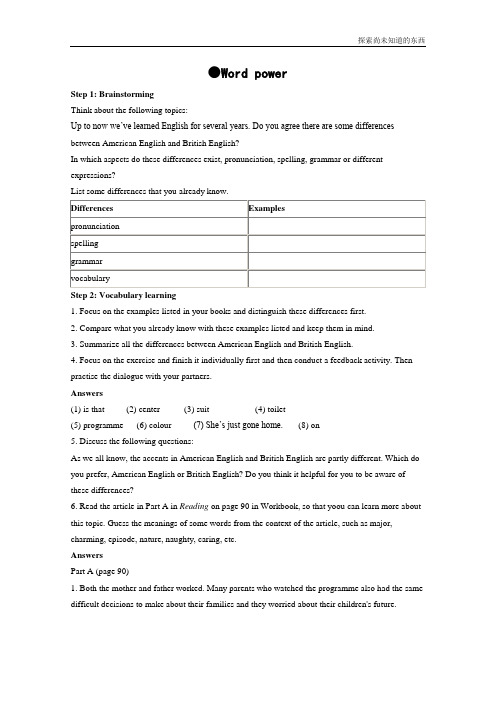
●Word powerStep 1: BrainstormingThink about the following topics:Up to now we’ve learned English for several years. Do you agree there are some differences between American English and British English?In which aspects do these differences exist, pronunciation, spelling, grammar or different expressions?List some differences that you already know.Step 2: Vocabulary learning1. Focus on the examples listed in your books and distinguish these differences first.2. Compare what you already know with these examples listed and keep them in mind.3. Summarize all the differences between American English and British English.4. Focus on the exercise and finish it individually first and then conduct a feedback activity. Then practise the dialogue with your partners.Answers(1) is that (2) center (3) suit (4) toilet(5) programme (6) colour (7) She’s just gone home.(8) on5. Discuss the following questions:As we all know, the accents in American English and British English are partly different. Which do you prefer, American English or British English? Do you think it helpful for you to be aware of these differences?6. Read the article in Part A in Reading on page 90 in Workbook, so that yoou can learn more about this topic. Guess the meanings of some words from the context of the article, such as major, charming, episode, nature, naughty, caring, etc.AnswersPart A (page 90)1. Both the mother and father worked. Many parents who watched the programme also had the same difficult decisions to make about their families and they worried about their children's future.2. He was naughty for being caught by the police and breaking his promise to his parents; but he was also caring and warm as he helped a homeless boy.3. Many teenage girls bought photos and posters of him and he was in many teen magazines.4. They felt disappointed when he was dishonest/did something bad but proud when he wascaring/did something good.5. The character Mike, and the fact that the family in the programme had similar problems to the people who watched the programme.Step 3: Vocabulary extension1. Focus on Part A and finish the exercise individually first. Then conduct a feedback activity. AnswersA 1. something easy to understand2. boring/ afraid to have fun3. listening carefully4. joke with someoneDo you know the meaning of the following sentences?2. Let’s continue with Part B, as there are more col loquialisms. Think over and discuss with each other first. If you still can't work out the meanings, consult the dictionary.Answers1. She is good at gardening.2. He is very clumsy.3.That is like criticizing someone else for a fault you have yourself.4. It is raining heavily.5. Don’t exaggerate something.ResourcesAmerican English and British English share a lot of similarities. However, there are still some differences. These differences are considered to be caused by several factors, such as different national histories, cultural development and the influences of local and regional idioms and expressions. Some words share the same pronunciation while their spellings vary a bit, for example, colour and color, cheque and check, realise and realize. In addition, different words are used to indicate the same thing. For example, ‘toilet’ in British English is ‘rest room’ in American English. Likewise ‘trousers’ are ‘pants’, ‘cooker’ is ‘stove’ and ‘angry’ is ‘mad’.。
牛津高中英语模块一unit2-Word-Power
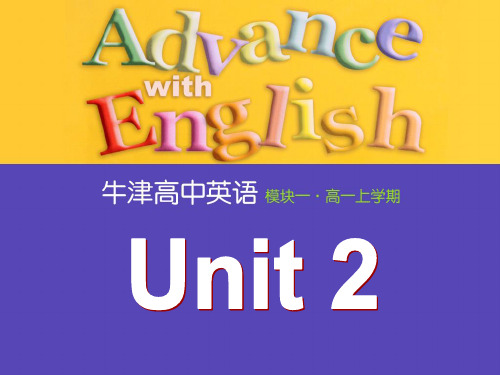
Read the following story and answer.
Joe (an American) Nancy (an Englishman) Once Joe came to Britain for the first time by air. When he arrived at Nancy’s home. He asked, “ Could I use your bathroom?” Nancy said ok and gave him a clean towel and told him that the bathroom was upstairs. After a while, however, Joe didn’t find the bathroom.
mean?
What is a colloquialism?
A colloquialism is an informal expression used in spoken English. Colloquialisms are never used in formal English or in writing, but are often used in conversations.
Sam: OK. Please call me at 33543165 if the students’ union organize a soccer ball match. AE
David: Good idea! You may call me on 25682275. BE
Sam: See you! AE David: Goodbye! BE
高一英语M1 U2 Word power课件牛津英语_必修1
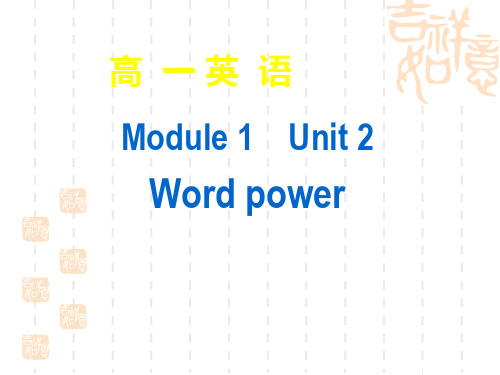
Colloquialisms
Don’t worry. It’s a piece of cake! something easy to do
Don’t be a wet blanket. Have some fun! boring / afraid to have fun
Go on, tell me. I’m all ears. listening carefully
candy Am.E sweets Bri. E
Differences in vocabulary
living room Am.E sitting room Bri.E
Differences in vocabulary
soccer (ball) Am.E football Bri.E
Differences in vocabulary
Are you serious? Don’t pull my leg. joke with someone
Match the following sentences:
Oh, my aching back. I don't believe you.
I don't buy your story. Oh, God!
Homework
1. Find more colloquialisms if you like.
2. Review what we have learned in this unit and preview Grammar.
1. From the story, we know there are some differences between American English and British English. But do you know in which aspect do they exist? 2. Could you list the differences you know?
高中英语(牛津译林版)必修一学案 Unit2 Growing pains《Word power》学案2

Module 1 Unit 2 Growing pains-word power学案Words:vacation n.假期,休假curtain n.窗帘sink n.水池,水槽,洗碗池garbage [U] 垃圾leave vt.使……处于某种状态,听任forbid v. (forbad(e), forbidden) 禁止scene n.(戏剧的)一场;场面;景色grandparent n.祖父(母);外祖父(母)mark n.分数;标志;记号period n.时间段,时期,阶段selfish adj.自私的suggest v.建议;暗示,使想起suggestion n. 建议behaviour n.行为behave v. (行为或举止)表现interest v.使……感兴趣interesting adj.有趣的,有意思的interested adj.感兴趣的explain v.解释explanation n. 解释touch v.触摸touched adj.感动的touching adj.感人的,令人感动的explain v.解释explanation n.解释reason n.理由reasonable adj.合乎情理的unreasonable adj.不合乎情理的punish v.惩罚punishment n.惩罚unpunished adj.免受惩罚的go unpunished没受惩罚bore v.使厌倦bored adj.感到厌倦了的boring adj.令人厌倦的mix v. 混合;混淆mixture n.混合物value n.价值valuable adj.宝贵的,有价值的n.贵重物品valueless adj.不值钱的,没有价值的argue v.争论argument n.议论,争论,论点freedom n.自由free adj.自由的;有空的true adj.真诚的,真实的truly adv.Useful expressions:be supposed to do sth. 应该做……,被期待做某事be in charge of sth. 负责某事be in one’s charg e / be in the charge of sb. 由某人负责punish sb. for sth. /for doing sth 因(做)某事而惩罚某人argue with sb. about/over sth. 与某人争论某事,就某事和某人争吵be upset about / over sth. 为……而感到心烦意乱make a difference 产生差异,使有所不同,起重要作用forbid sb. to do sth. / forbid sb. from doing doing 禁止某人做某事What’s up? 怎么了?be hard on sb. 对某人苛刻in the form of a dialogue 以对话的形式should have done sth. 本应该做某事而未做followed by a big dog 身后跟着一条大狗go unpunished 饶过;没被惩罚can’t wait to do sth. 迫不及待地做某事have one’s arms crossed 双臂交叉turn up the radio a little 把收音机音量开大一点leave out 漏掉after all 毕竟;别忘了at present 目前,当前like crazy 发疯似地,拼命地do sth. like crazy疯狂地干某事in one’s spare time 在某人业余时间里keep sth. in mind 牢记……be meant to be / mean … to be 本意为in a mess 处于混乱状态go out (灯)熄灭do with 处理now that 既然,由于insist on坚持get the room tidied up 把房间整理好clean up收拾干净the only child 独生子deserve to do sth. 配得上做某事not … any more不再,再也不as though 似乎,好像have a good laugh over对……大加嘲笑mix up 混淆,混合be related to和……有关系of great value有很大价值Internet café网吧be proud of 以……为自豪stay up late 不睡觉,熬夜到很晚fail (in) the Maths test 没有通过数学测试be proud of 以……为自豪take / follow one’s advice 接受某人的忠告stay up late 不睡觉,熬夜到很晚fail (in) the Maths test 没有通过数学测试take / follow one’s advice 接受某人的忠告prevent sb. from doing sth.阻止某人做某事waste some time doing sth. 浪费时间做某事refuse to do sth. 拒绝做某事I. Vocabularysurprise vt.使惊奇,是震惊[U] 惊奇,诧异[C] 使人吃惊的事,出人意料surprised adj.“感到惊讶的”,指某人对某事感到震惊surprising adj.“使人惊奇的;惊人的”,事物本身令人惊讶则用surprising[搭配]be surprised at …对……感到吃惊in surprise惊奇地to one’s surprise使某人吃惊的是1. ______ ( surprise ) at the ________ (surprise ) news, the _______ (surprise ) student said with a _________ (surprise ) look, “It’s really very ________ (surprise )”.2. The ______ look on his face suggested he ______ that.A. surprised; wouldn’t have expectedB. surprising; hadn’t expectedC. surprising; would expectD. surprised; hadn’t expected3. 使我感到惊奇的是,我父亲对这个令人震惊的消息并不感到惊讶。
高中英语 Unit2 Word Power教案 牛津译林版必修1-牛津版高一必修1英语教案

【教学目标】Enable Ss to learn some differences between A and E.
【教学重点】Tell the differences between American English and British English.
【教学难点】How to tell American English from British English.
3.that前不能有介词。
4.某些在从句中充当时间,地点或原因状语的“介词+关系词”结构可以跟关系副词when 和where 互换。
e.g.This is the house in which I lived two years ago.
This is the house where I lived two years ago.
关系副词起连接主句和从句的作用,又在从句中作状语,when, where和why分别表示时间,地点和原因。
1. when
在从句中作时间状语。常用on which, in which, at which, during which等代替。
e.g. April the first is the day when people make fun of others.
c.Dad is a ຫໍສະໝຸດ ersonIcan easily talk to. (t)
d.Dad is a person to thatIcanIcan easily talk to. (f)
e.Dad is a person thatIcan easily talk to .(t)
f.Dad is a person whoIcaneasilytalk to.( t)
高中英语 Unit2 Word power课件 牛津译林版必修1

Homework
1.Try their best to keep the examples of American English and British English in their mind. 2. To find more colloquialisms if they like. 3.To revise the play and find the sentences with attributive clause.
2.If there are some, in which aspect do they exist?
3. Have you found any difference between American English and British English in the play?
